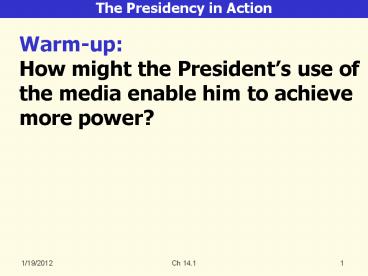The Presidency in Action - PowerPoint PPT Presentation
1 / 24
Title:
The Presidency in Action
Description:
Source of presidential power - Framers were wary of tyrants ... 6/13/09. Ch 14. 24. Legislative and Judicial Powers. Clinton's. Pardon. List. Summary ... – PowerPoint PPT presentation
Number of Views:56
Avg rating:3.0/5.0
Title: The Presidency in Action
1
The Presidency in Action
Warm-up How might the Presidents use of the
media enable him to achieve more power?
2
Growth of Presidential Power
- Source of presidential power
- Framers were wary of tyrants
- Constitution deals with them in sketchy
fashion
- Article II is most loosely
- drawn chapter
3
Growth of Presidential Power
1. pressures from economic and social life
2. need for decisive action in time of
national emergency
3. Congress has provided only basic outlines
of public policy
4. Presidents use of media
4
(No Transcript)
5
Growth of Presidential Power
Review What has caused the Presidents power to
grow over time?
6
The Presidents Executive Power
Warm-up What did Thomas Jefferson mean when he
wrote in 1789 The execution of the laws is
more important than the writing of them.
7
The Presidents Executive Powers
- Executing the Law
- the President is responsible
- for carrying out the laws
- interprets the law (ex. immigration law)
- decides how vigorously it will
- be applied
8
The Presidents Executive Powers
1. The Ordinance Power
- comes from Constitution and
- Congress
- authority to issue executive
- orders, the force of law
- give executive branch the
- power to administer laws
9
The Presidents Executive Powers
2. Appointing Power (from the Constitution)
- President names most of the
- top ranking officers
- includes diplomats, cabinet
- members, judges
- (must be approved by Senate)
10
The Presidents Executive Powers
2. Appointing Power (cont.)
- more than half of of the officials
- of the executive branch and
- almost all federal civilian
- employees are selected by
- civil service exam
- Senatorial courtesy
11
The Presidents Executive Powers
3. Removal Power
- power to remove generally upheld by Congress
- cannot remove heads of
- independent agencies except
- for incompetence
- limits placed by Supreme Court
12
The Presidents Executive Powers
3. Removal Power
- limits placed by Supreme Court
- ex. Humphrey v. U.S. president
- cannot remove member of
- independent agency except for
- incompetence or malfeasance
13
The Presidents Executive Powers
Review 1. What is an executive order? 2. Can the
president remove anyone from an appointed
office?
14
Diplomatic and Military Powers
Warm-up How do you feel about the President
sending troops to Iraq?
15
Diplomatic and Military Powers
1. Power to make treaties
- may negotiate treaties or
- international agreements
- Senate must approve treaties (2/3 vote)
16
Diplomatic and Military Powers
2. Executive agreements
- most international agreements between
president and foreign leaders
- do not require Senate approval
17
Diplomatic and Military Powers
3. Powers of recognition
- acknowledge the legal existence
- of countries
- recognition often determines
- the countrys future
18
(No Transcript)
19
Diplomatic and Military Powers
4. Military powers
- President shares powers with Congress, but
has few limits
- delegates much of their
- command authority to military
- subordinates
- often use military without
- declaration of war
20
Diplomatic and Military Powers
4. Military powers (cont.)
- often expanded to include
- nonmilitary matters (Haiti, 1994)
- may use the military to keep
- peace in times of domestic
- turmoil
21
Diplomatic and Military Powers
4. Military powers (cont.)
- War Powers Resolution of 1973 - inform
Congress of commitment of troops within
48 hours - approval for commitment over
60 days - constitutionality in dispute
22
Legislative and Judicial Powers
1. Legislative
- State of the Union address, budget and
economic report
- recommends legislation
- veto power
- can call special session
- can adjourn Congress
23
Legislative and Judicial Powers
2. Judicial
- may grant reprieves and
- pardons in federal cases
- can commute or reduce
- sentences
- may grant amnesty general
- pardon to a group of violators
- (Carter draft evaders)
24
Legislative and Judicial Powers
Clintons Pardon List
Summary

